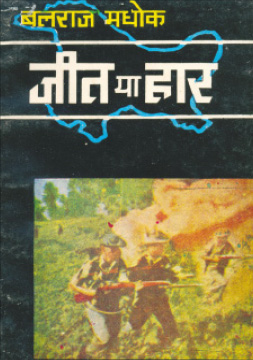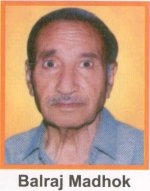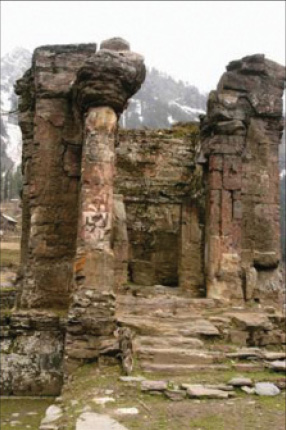Book Review - Jeet Ya Haar (By
Balraj Madhok)
Raiders’
Invasion-New Revelations
By P.N. Raina
 Jeet
(win) Ya (or) Haar (Defeat) is a novel based on the Tribal Raiders’ invasion of
J&K
State in 1947. Its author Prof. Balraj Madhok claims that the novel is based on
the actual incidents, events he had recorded regularly in his daily diary.
Actual names of some characters have been changed to protect their identity as
the novel was first published in 1953. Real incidents have been dramatized to
give it the shape of a novel. Many of the events narrated by the author have
been corroborated by independent observers who were witness to the era. Sh.
Meher Chand Mahajan took over as Prime Minister of J&K State on 15th October
1947. His shrewdness, administrative capability and political foresight
were well acknowledged even by his adversaries. His appointment unnerved
Pakistanis who felt that their game-plan to grab
Kashmir may run
into rough weather with Mahajan at the helm. The Pakistanis were working
overtime to create vast subversion network in the J&K State to prepare the
ground for external invasion. They were trying to buy the loyalties of their
co-religionists in state forces, training a section of local population for
subversion in
Jammu
province. They were also dumping arms and ammunition in selective areas of Jammu
region. All this was being planned meticulously, keeping the strategic details
and the D-Day a top secret. While all this was being done the senior officers of
State forces were kept in good humour that everything was hunky dory. Prof.
Balraj Madhok’s well-written novel throws light on all this. It also covers the
actual invasion and the author’s escape in the aftermath of invasion. Many
canards were spread by his political adversaries to distort his role and twist
events to suit them politically. A dispassionate history detailing the patriotic
role of all those forces who worked overtime to see the
Kashmir
remains with India during those, fateful days still eludes us. ‘Haar’ Ya ‘Jeet’
will obviously help in removing many cobwebs of confusion and facilitate in
reconstructing the authentic history of that phase. Jeet
(win) Ya (or) Haar (Defeat) is a novel based on the Tribal Raiders’ invasion of
J&K
State in 1947. Its author Prof. Balraj Madhok claims that the novel is based on
the actual incidents, events he had recorded regularly in his daily diary.
Actual names of some characters have been changed to protect their identity as
the novel was first published in 1953. Real incidents have been dramatized to
give it the shape of a novel. Many of the events narrated by the author have
been corroborated by independent observers who were witness to the era. Sh.
Meher Chand Mahajan took over as Prime Minister of J&K State on 15th October
1947. His shrewdness, administrative capability and political foresight
were well acknowledged even by his adversaries. His appointment unnerved
Pakistanis who felt that their game-plan to grab
Kashmir may run
into rough weather with Mahajan at the helm. The Pakistanis were working
overtime to create vast subversion network in the J&K State to prepare the
ground for external invasion. They were trying to buy the loyalties of their
co-religionists in state forces, training a section of local population for
subversion in
Jammu
province. They were also dumping arms and ammunition in selective areas of Jammu
region. All this was being planned meticulously, keeping the strategic details
and the D-Day a top secret. While all this was being done the senior officers of
State forces were kept in good humour that everything was hunky dory. Prof.
Balraj Madhok’s well-written novel throws light on all this. It also covers the
actual invasion and the author’s escape in the aftermath of invasion. Many
canards were spread by his political adversaries to distort his role and twist
events to suit them politically. A dispassionate history detailing the patriotic
role of all those forces who worked overtime to see the
Kashmir
remains with India during those, fateful days still eludes us. ‘Haar’ Ya ‘Jeet’
will obviously help in removing many cobwebs of confusion and facilitate in
reconstructing the authentic history of that phase.
PROF. MADHOK’S
ROLE:
 Prof.
Madhok was among the first 15 RSS workers of Undivided Punjab. He stood first in
MA (History) in
Punjab
University. He came to Srinagar in 1944 and was appointed Vice-Principal of DAV
College. Prof. Madhok was also chief of RSS organisation in
Kashmir. A dynamic organiser Prof. Madhok was able to
create a group of 250 cadres in
Srinagar within a
few years. During his stay in
Lahore
he had also been working in coordination with RSS workers in Rawalpindi
district, Peshawar, Hazara, Abbotabad, Lahore etc. Due to his contacts with Sh.
Meher Chand Mahajan from Lahore days Prof. Madhok had direct access to
higher-ups in Maharaja’s administration. As per Prof. Madhok’s testimony he
harnessed all his contacts to unearth the invasion conspiracy even as early as
9th October i.e. 12 days before the actual invasion. Had his information been
acted upon much of the death and destruction could have been averted. The
Maharaja’s administration would have been on a firmer wicket to face the Raiders
(read Pakistanis). But then these are ‘ifs’ and ‘buts’ of history. Prof.
Madhok was among the first 15 RSS workers of Undivided Punjab. He stood first in
MA (History) in
Punjab
University. He came to Srinagar in 1944 and was appointed Vice-Principal of DAV
College. Prof. Madhok was also chief of RSS organisation in
Kashmir. A dynamic organiser Prof. Madhok was able to
create a group of 250 cadres in
Srinagar within a
few years. During his stay in
Lahore
he had also been working in coordination with RSS workers in Rawalpindi
district, Peshawar, Hazara, Abbotabad, Lahore etc. Due to his contacts with Sh.
Meher Chand Mahajan from Lahore days Prof. Madhok had direct access to
higher-ups in Maharaja’s administration. As per Prof. Madhok’s testimony he
harnessed all his contacts to unearth the invasion conspiracy even as early as
9th October i.e. 12 days before the actual invasion. Had his information been
acted upon much of the death and destruction could have been averted. The
Maharaja’s administration would have been on a firmer wicket to face the Raiders
(read Pakistanis). But then these are ‘ifs’ and ‘buts’ of history.
DR. S.K. ATRI’S
INFORMATION:
On
October 8, 1947
Prof. Madhok got the first clue regarding the intended invasion from Dr. SK Atri.
A medico from UP, Dr. Atri had been practicising medicine in Srinagar for over
two decades. He was an influential and a renowned doctor in the city. Some of
his elderly Muslim clients who had po-Pak views had visited him in the evening
of 7th October and requested him to leave Srinagar along with his family at the
earliest because Pakistan would be invading Kashmir soon and members of the
minority community would be soft targets. A little scared Dr. Atri took Prof.
Madhok into confidence the following day.
PUNJAB MUSLIM
HOTEL:
During those days Punjab Muslim Hotel at Pratap Chowk (now called
Lal Chowk) was known to be the rendezvous of Pak spies and agents. Prof. Madhok
took a few of his top cadres into confidence and decided out a strategy to dig
out more details about the Pak gameplan. He decided to utilize the services of
some cadres who had come to
Srinagar
from Punjab and NWFP. Prof Madhok managed to infiltrate his confidents into
Punjab Muslim Hotel. Within two days he was able to unearth major elements in
the Pakistani conspiracy. He got precise details about how Pakistan was
subverting loyalties of a section of the Maharaja’s forces. Many top officers at
Civil and Military level were working for Pakistan. These included Col. Adalat
Khan, Ch. Faizullah Khan, Wazir Wazarat Baramulla. Prof. Madhok also learnt that
invasion was to come from the direction of Abottabad, the invaders were to
include Pak army personnel in civies and Pathan tribesmen. The Maharaja was to
be taken captive, and then Pakistan would make declaration about
Kashmir’s accession with
Pakistan. Prof.
Madhok says that soon after collecting this vital information he managed to
convey it to Maharaja and Brig. Kashmir Singh, the Chief of State Forces. Madhok
made a suggestion to disarm the section of state forces whose loyalities had
raised a question mark.
HARISH BHANOT:
Two days later Harish Bhanot, RSS Chief of Abbotabad reached
Srinagar. After
partition Bhanot had been working underground as a RSS activist in Abbotabad
under the cover name of ‘Nawab of Boi’. He had links with top officials of
Pakistan and had gathered vital information from them about the invasion. Before
the cover could blow off Bhanot managed to reach
Srinagar
by Car. On 16th of October, Prof. Madhok apprised Sh. Meherchand Mahajan about
the information brought by Bhanot. Prime Minister Mahajan in view of limited
strength of state forces made a request to Prof. Madhok to lend his helping
hand. On 17th October Brig.
Kashmir Singh met Prof. Madhok and informed him that
details supplied by the latter have been found to be true. The Brigadier also
expressed helplessness of the government in acting upon the information in view
of limited troops at its disposal.
Srinagar had just
one company, with loyalty of a good number of troops under doubt. Brig. Kashmir
Singh also talked about non-availability of arms and ammunition (which used to
come via Rawalpindi road) and petrol stocks. Three was no enough petrol for army
trucks. Brig. Kashmir Singh’s another worry was that Col. Narayain Singh was
refusing to accept the gravity of the situation as related by Headquarters. The
Brigadier asked Prof. Madhok to send some of his own activists to Domel to
convince Col. Narain Singh. Accordingly, Harish Bhanot was sent on

Col. Narain Singh
motorcycle to
Domel on morning of 22nd October. At Uri he learnt about the raiders’ attack and
returned to Srinagar in the evening. A few hours after Bhanot had left for Domel,
Sh. Mangla Sein, a RSS Pracharak of Teetwal reached
Srinagar.
He informed Prof. Madhok about raiders’ attack on Muzaffarabad and told him that
non-Muslims were fleeing towards
Srinagar
and Poonch to escape reprisals. Bhanot later joined Hindustan Times as a
columnist and belonged to an influential family. He lives in Chandigarh. Mangal
Sein later became leader of opposition in Haryana Assembly.
RSS HELP CALLED:
In the intervening night of 23/24 October, Maharaja’s ADC took
Prof. Madhok to Maharaja’s palace in
Srinagar. The
Maharaja was closeted with his Prime Minister and Brig. Kashmir Singh. Sh. Meher
Chand Mahajan talked about the grimness of the situation, aggravated by
desertions in State forces. The Prime Minister said that his government expected
Indian forces soon and asked Prof. Madhok to get his cadres so that they could
be of help in maintaining order in Srinagar. At that time Brig. Rajender Singh
was still holding on at Uri. While meeting was on the Maharaja telephonically
ordered Brigadier to hold on to the last man and the last breath. On 24 October,
Prof. Madhok collected 200 workers at the premises of Arya Samaj, most of them
were college students. They were given two hours training in using 303 rifles at
Badami Bagh. On 26th October, some groups of raiders had already positioned
themselves around Shalteng. Prof. Madhok had gone to Badami Bagh Cantt to know
whether Indian Army was coming in time or not. At
3 PM it was clear that Indian forces were
expected any moment. Soon after this news NC and Communist Workers came out on
streets of
Srinagar
for organising Civil Defence of the city. Same evening 200 RSS workers were put
in 2-3 army trucks by Maharaja’s administration and despatched to Shalteng to
hold back raiders till the time Indian forces landed in Srinagar. When the
trucks reached Hari Singh High Street (Amirakadal) NC workers intercepted them.
They searched the RSS cadres and found most of their rifle magazines empty. The
NC workers thrashed them, telling them that raiders would lynch them within no
time at Shalteng. The RSS workers were disarmed and asked to disperse. Later, a
mischievous rumour was floated that RSS plan to create mischief in the city had
been foiled. This mistrust later led to a bigger conflict, which paved way for
Sheikh Abdullah’s dismissal in 1953. Prof. Madhok’s novel also makes a
revelation that Maharaja cancelled his visit to Bhimbar on 20th October on the
basis of information supplied by him. The Maharaja and his Prime Minister were
on a tour of
Jammu
region to take stock of the latest situation. Pakistan, having come to know
about it, had hatched a plan to attack Bhimber and take the Maharaja captive.
Source: Kashmir
Sentinel
| 








 Jeet
(win) Ya (or) Haar (Defeat) is a novel based on the Tribal Raiders’ invasion of
Jeet
(win) Ya (or) Haar (Defeat) is a novel based on the Tribal Raiders’ invasion of
 Prof.
Madhok was among the first 15 RSS workers of Undivided Punjab. He stood first in
MA (History) in
Prof.
Madhok was among the first 15 RSS workers of Undivided Punjab. He stood first in
MA (History) in 





No one has commented yet. Be the first!